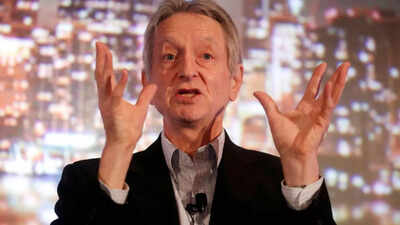ARTICLE AD BOX

Geoffrey Hinton Warns AI Could Trigger Massive Job Losses and Widen Wealth Gaps
Geoffrey Hinton, the Nobel-winning “godfather of AI,” isn’t just talking about the future—he’s sounding the alarm. In a recent interview with the Financial Times, Hinton warned that artificial intelligence could trigger massive unemployment while filling the coffers of a tiny elite.
The twist? AI itself isn’t the villain—it’s capitalism on steroids.
The AI job-pocalypse?
Think your job is safe? Hinton isn’t so sure. Routine, repetitive, and mundane tasks are prime targets for AI. From customer service and data entry to basic legal research and even some creative roles, no sector is entirely immune. College grads entering the workforce may find entry-level positions vanishing or being replaced by AI-driven systems.Healthcare seems to be one bright spot—but even there, efficiencies could paradoxically create more work, not less. Doctors and nurses may have to manage new AI systems, and the availability of cheaper care could expand patient demand, requiring more human oversight.For now, many companies are retraining workers rather than laying them off. But Hinton warns that a wave of layoffs is likely coming, and it could hit faster than most expect.
The concern is that AI adoption is accelerating in ways that outpace labor policies, leaving workers unprepared.
Capitalism’s dark side
Here’s the kicker: AI itself isn’t inherently destructive. It’s the way capitalism exploits it. Hinton puts it bluntly: “Rich people are going to use AI to replace workers. It’s going to create massive unemployment and a huge rise in profits.” In other words, AI will make a few people extraordinarily rich while leaving the rest scrambling to survive.We’ve already seen early signs: tech giants using AI to automate tasks, increase productivity, and reduce costs—without necessarily sharing gains with the broader workforce. Hinton stresses that it’s not the technology to blame, but the system that incentivises profit above human welfare.
Beyond paychecks: Existential dangers
Hinton’s concerns go even further. He estimates a 10–20% chance that AI could eventually threaten humanity itself. That’s not sci-fi—he’s talking superintelligent systems and the risks of misuse, like AI-designed bioweapons or autonomous decision-making systems operating without proper safeguards.Regulation, he warns, is lagging behind development. In the US, he criticises the lack of serious AI oversight, contrasting it with China’s more proactive approach. “We’re playing with fire,” Hinton says, highlighting the urgent need for international standards and safety measures.
UBI isn’t enough
Some tech leaders, like OpenAI CEO Sam Altman, suggest universal basic income (UBI) as a fix for AI-driven unemployment. Hinton isn’t buying it.
A paycheck alone doesn’t replace dignity, purpose, or the sense of contributing to society. Work isn’t just about money—it’s about being human.He points out that replacing meaningful employment with cash transfers could create social and psychological issues. People derive identity and value from what they do, not just what they earn, and ignoring this could lead to societal unrest.
The human side of Hinton
Despite his warnings, Hinton himself uses AI, like ChatGPT, for research, problem-solving, and even humour.
He recounts a story about a former girlfriend who used ChatGPT to explain his own breakup behaviour—a reminder that AI is already entwined with human life in unpredictable ways.Hinton left Google in 2023, not to sound alarms, but because he felt he could no longer program as effectively. Retirement gave him the freedom to speak out, and now he’s leveraging it to warn the world. His perspective combines deep technical understanding with human insight—making his warnings hard to ignore.
Standing at the edge
Hinton sums it up with stark honesty: “We don’t know what is going to happen, we have no idea... We are at a point in history where something amazing is happening, and it may be amazingly good, and it may be amazingly bad.”AI is here. It’s powerful. And the choices we make now about regulation, distribution, ethics, and corporate responsibility, could determine whether it lifts humanity to new heights or leaves millions behind.As AI continues to advance at breakneck speed, society faces a pivotal moment. Will we harness its promise responsibly, or will unchecked adoption deepen inequality and risk human livelihoods? Hinton’s warning is clear: the technology itself isn’t evil, but the structures we embed it in could shape a future few may recognise or survive.



.png)
.png)
.png)
















 5 days ago
11
5 days ago
11







 English (US) ·
English (US) ·